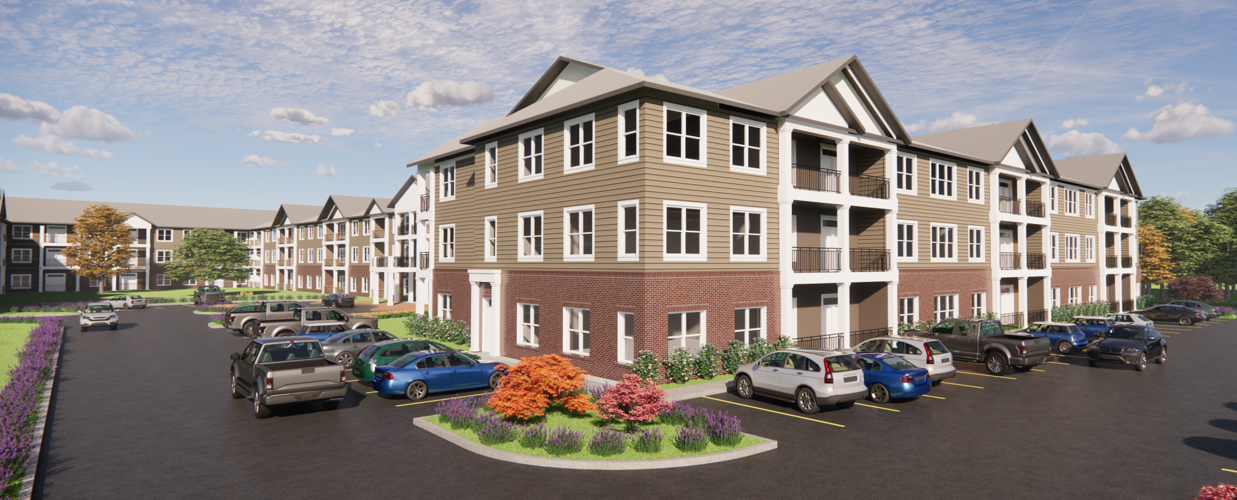LOUISVILLE, Ky. (WDRB) — A developer is once again attempting to build hundreds of affordable housing units for low-income renters just outside Prospect — a plan that so enraged residents of the wealthy suburban city that they cobbled together $230,000 in an effort to thwart it when first proposed five years ago.
LDG Development’s reworked plan for “Prospect Cove” comes after the Metro Council in 2017 took the unusual step of overruling city planners and rejecting a zoning change that was vehemently opposed by Prospect residents.
Prospect’s mayor and other residents have said their ongoing opposition to Prospect Cove has to do with the scale of the complex, not the people who would live there.
“The immense size, the quantity of it, is inappropriate in or near the city of Prospect,” Prospect Mayor John Evans told WDRB News in an interview Wednesday.
LDG claims the real motivation is illegal discrimination against people of color and low-income tenants.
The company says evidence recently gathered as part of its lawsuit against Metro government and Prospect — including depositions of Evans and some Metro Council members — buttresses those claims.
“It supports the position that we've held from the very beginning: That it has nothing to do with the development itself but everything to do with the race and the socio-economic status of who this development will serve,” Christi Lanier-Robinson, LDG’s executive vice president, told WDRB on Wednesday.
Latest plan largely unchanged
The latest plan for Prospect Cove calls for a three-story complex with 178 one- and two-bedroom units. It’s scaled down slightly from the 2017 plan of 198 units and four stories.
LDG is no longer designating the units as “senior” housing for those over 55, but “most if not all” of the apartments would still be reserved for tenants who meet low-income guidelines established by federal Department of Housing & Urban Development, Lanier-Robinson said.
That means tenants could earn no more than $47,450 for a single person to $67,750 for a family of four, according to HUD’s 2022 guidelines.
Louisville Mayor Greg Fischer and other elected officials have said the city has an acute shortage of affordable housing, and that affordable units should be available in every corner of Jefferson County.
However, those aspirations often run into neighborhood resistance when specific plans are released.
Low-income renters are not the norm in Prospect, where the vast majority of residents are high-income homeowners.
The median family income in 40059, the zip code that largely encompasses Prospect, was $175,938 in 2020, or more than twice the median family income of Jefferson County as a whole, $75,482, according to U.S. Census data.
More than 92% of 40059 residents own their homes, compared to 61% for Jefferson County as a whole.
Prospect Cove would be built on a vacant lot — 6500 Forest Cove Lane and 7301 River Road — near the strip center containing the Kroger grocery.
Given the considerable interest in the project, the Metro Planning Commission next week will hold a special nighttime public hearing to consider LDG’s zoning change. The meeting is at 6:30 pm on Tuesday, Oct. 18 at Kentucky Country Day School, 4100 Springdale Road.
About 400 residents — the vast majority opposed to Prospect Cove — attended the 2017 public hearing for the original plan, according to Evans.
On Tuesday, “I am hopeful that everyone who cares about this issue will come to this critical hearing,” Evans wrote on Prospect’s website recently.
Lawsuit evidence
LDG sued Metro government and the Metro Council in late 2017, arguing that the “unlawful and discriminatory denial” of the zoning change for Prospect Cove violated the U.S. Constitution’s equal protection clause and the federal Fair Housing Act.
LDG plans to ask a judge Monday to let it broaden those allegations after years of discovery in the case, including depositions with Metro council members, Prospect officials, emails and other new information. It now accuses the city of Prospect of those federal violations that also are levelled at Metro government.
In particular, LDG’s amended complaint filed in court documents this week accuses Evans, Louisville Metro Council member Scott Reed and others of working to keep the project from advancing because of who would live there.
“Prospect, its taxpayers, Mayor Evans, Councilmember Scott Reed, and others conspired together with a discriminatory motive to prevent the development of Prospect Cove Senior in order to exclude minorities, senior residents, disabled residents, residents from certain national origins, and low-income residents from living in or near Prospect,” LDG’s proposed new complaint reads.
In one example, LDG claims in court documents that Evans emailed a Prospect resident about a Courier Journal article in November 2017 shortly after the Metro Council voted 14-11 to deny the zoning change.

Prospect Mayor John Evans spoke to WDRB News in his office on Oct. 13, 2022.
Evans wrote that the article made clear that LDG’s aim was to “relocate downtown’s population problems to Prospect,” adding that “[w]e really dodged a bullet this time,” according to court records.
LDG claims Evans said during a deposition in the case that Louisville Mayor Greg Fischer has “a lot of problems downtown and he’s trying to spread them out” across Jefferson County, including Prospect.
Evans said in an interview with WDRB News that his attorney advised him against speaking to the LDG claims.
“I’m not going to respond to those allegations because they are seeking to sue Prospect, and the matter going into litigation -- it would simply be inappropriate … I will say, however, that as far as racial stuff is concerned, until recently my next-door neighbor was African American. Hell of a nice guy … The people who live there now are Hispanic. And the only problem with that is that we can't talk to each other, because I don't speak their language and they don't speak mine.”
Prospect City Attorney Chris Gorman, a former Kentucky Attorney General, said LDG’s claims amount to “race baiting.”
He and Evans said Prospect still objects to the apartment plan based solely on its size.
“That's what this is all about,” Gorman said. “They want to scream race. They don't want to try it on the facts, because the facts aren’t on their side.”
LDG also claims that Prospect interfered with its business by “actively trying to undermine, interfere with, and destroy LDG’s interests” in the original Prospect Cove plan. Among other examples, it says the city raised funds in an effort to buy the land for another development project that didn’t include affordable housing.
In a deposition taken earlier this year, Evans acknowledged that in early 2017, he solicited private developers who said they could build restaurants, office buildings and “some apartments” on the Prospect Cove site. But they needed to match the $2.8 million that LDG was under contract to pay for the property, and the developers thought it was worth only $1.6 million.
Evans testified that he pursued a plan to close the gap, which involved Prospect purchasing a portion of the site for a public park and additional effort to raise $390,000 in voluntary contributions from residents. About 290 households sent checks totaling $230,000, Evans said in the deposition, excerpts of which are included in LDG’s lawsuit.
The effort fizzled when LDG raised its bid for the land to $3 million or $3.1 million, Evans said in the March 30, 2022 deposition.
LDG also claims that Reed, the Metro Council member who sponsored the ordinance against the zoning change, kept documents on the case in what was dubbed the “Big File.”
In the ongoing lawsuit, LDG has outlined how it believes Reed’s ordinance was factually flawed. Reed’s file contains “notes, correspondence, and other documents that reflect the motivations and secret dealings that led to the vote to deny the zoning change,” according to its new filings.
Those records are public, the developer alleges, and haven’t been produced. Reed, a Republican representing the 16th Metro Council District, which includes Prospect, “intentionally disposed of or otherwise destroyed the Big File, knowing its destruction was in violation of Kentucky law,” LDG alleges.
Reed declined to comment. “On the advice of attorney/council, I cannot speak on zoning and legal matters,” he said in a text message.
Proximity to gas station questioned
On Wednesday, Evans raised another objection that he and others have long had to Prospect Cove: That it would be built near the Kroger gas station, which would expose residents to cancer-causing fumes.
LDG has said the plan complies with Kentucky environmental regulations, and professional planners didn’t raise objections based on proximity to the gas station when the 2017 plan was vetted.
LDG claims in the lawsuit that Prospect residents’ concerns about the gas station are belied by the fact that they were willing to build a public park and restaurants on the site.
But in his deposition, Evans said the park would have been on the other end of the site, farthest from the gas station, and that a smaller apartment complex could also be placed at greater distance from the fumes.
He told WDRB, “If it (the development) were smaller, you could move it further away from the from the gas station.”
LDG is separately planning a second affordable housing development called Veridian at Prospect’s Edge, which would be off U.S. 42 just north of Prospect.
With 164 units, Veridian would be slightly smaller than Prospect Cove. It could house former residents of the Beecher Terrace public housing complex in west Louisville, the company has said.
Lanier-Robinson said the developer is still pursuing the plan, but hasn't started construction. Unlike Prospect Cove, the Veridian development does not need a zoning change.
Evans also opposes the Veridian plan because its location is too remote and not walkable to anything, he has said.
“There is nothing up there…," he said in the March 2022 deposition. "It’d be like taking people and putting them out in a cornfield."
Copyright 2022 WDRB Media. All rights reserved.














